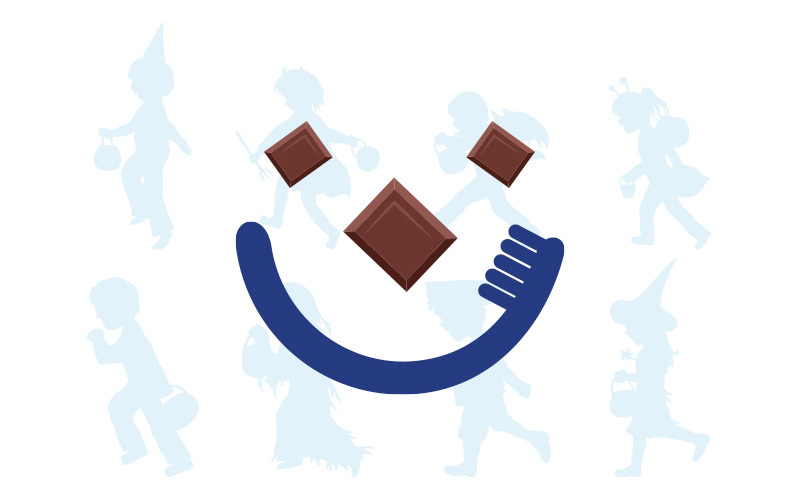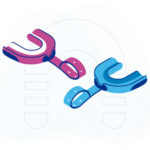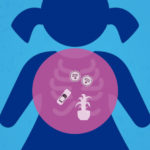Cavities are no trick: How to balance Halloween candy with healthy teeth

Believe it or not, dentists don’t dislike Halloween. They don’t secretly wish for kids to not eat candy. What dentists do want is for children to avoid certain ultra-sugary sweets and to practice moderation when munching through the contents of their trick-or-treat bags.
“It’s important for kids to have fun,” says Matthew Harper, DDS, an associate in the Department of Dentistry at Boston Children’s Hospital. “They should celebrate Halloween.”
Yes, let your child collect as many treats as they want. The spirit of the holiday should not be diminished by parental concerns about sugar. The time to encourage dental hygiene comes after all the door knocking.
Have the “Halloween candy” talk with your kids
Dr. Harper recommends sitting down with your child soon after Halloween and letting them select some favorite sweets from their bounty. Here’s when you can release your inner Willy Wonka: Guide them toward chocolate bars — assuming they have no allergies — and away from gummy and hard candy. (We’ll chew over that advice shortly.)
“Have them pick out a certain number of things they want,” Dr. Harper says. “Put aside the rest, somewhere they don’t have access. Eventually you can consider giving the excess to a dental office that does a trade-in — candy for a toy — or donates it to troops overseas.”
Your child should approach the candy they keep by following two guidelines: limit it to a treat or two a day, always after a meal, and only sweets that don’t linger long on teeth. That second bit of advice is why Dr. Harper recommends chocolate bars. Chocolate melts fast and its sugars don’t stay on teeth for hours. Dark chocolate is even lower in sugar. “It’s probably the best thing for kids to get a sugar fix and not worry about cavities.”
It’s not just the amount of sugar but also how long it stays on teeth
What does stick, longer than you’d probably suspect, and cause damage are candies like Sour Patch Kids and all other gummy and fruit snacks. The sugars from those candies settle into the grooves of teeth and can still be seen after brushing. (All year long, Dr. Harper recommends not letting your child eat fruit snacks; they are anything but healthy for teeth, regardless of how they are advertised as healthy.)
“People usually think about the amount of sugar but not the time it’s affecting teeth,” Dr. Harper says. “Of course, it’s always best to have your child brush their teeth right after eating, especially sweets, to get that sugar right off.”
Limiting candy to one or two pieces immediately after a meal allows your child’s natural cavity-fighting defenses go to work. “After you eat a meal, you have more saliva in your mouth and, acting with the tongue, it’s a form of oral cleaning. Saliva buffers out the acidic sugar. But when you’re constantly snacking before meals and long after them, the mouth can’t quite buffer the acid, and that’s how cavities form.”
Also, it’s best if your child avoids Tootsie Pops, other lollipops, and all hard candy. Biting on those puts teeth at risk of cracking and can harm teeth that have fillings.
Let fun come first; hygiene encouragement can come later
When Dr. Harper was a child and went trick-or-treating in his Oakville, Ontario, neighborhood, a dentist would hand out toothbrushes. He’s not saying you should follow that dentist’s lead. Aside from chocolate bars, you could also hand out stickers or trinkets in consideration of those who are allergic to chocolate.
Still, your kid shouldn’t think about dentists on Halloween — unless they’re dressing up as one. Let them fill up their pillowcases on that special holiday, although Dr. Harper recommends asking your child to not eat candy while they’re trick-or-treating. Once you’re home, let your child have a few candies all at once, while you have a “sweet” talk with them about the importance of moderation, candies with relatively low sugar, and everyday dental hygiene. And remember: Have them brush their teeth before going to bed Halloween night.
Learn more about the Department of Dentistry or make an appointment.
Related Posts :
-

Save that shot and your child’s teeth: The benefits of mouthguards
Competitive sports can get intense. They can also get physical, with athletes inadvertently colliding and balls moving fast at all ...
-

Teething: Which remedies are safe for babies?
The arrival of your infant’s first tooth is a milestone. But it can also signal the beginning of a ...
-
WCVB-TV: Boston Children's doctor on best Halloween trick-or-treat options in COVID-19 pandemic
In her weekly live segment with WCVB-TV channel 5, Boston Children’s Kristin Moffitt, MD, discusses some safer options for celebrating ...
-

COVID-19 pandemic may put kids at risk for accidental poisonings
In the effort to keep kids safe from the new coronavirus, families could be unwittingly putting them at risk for ...




